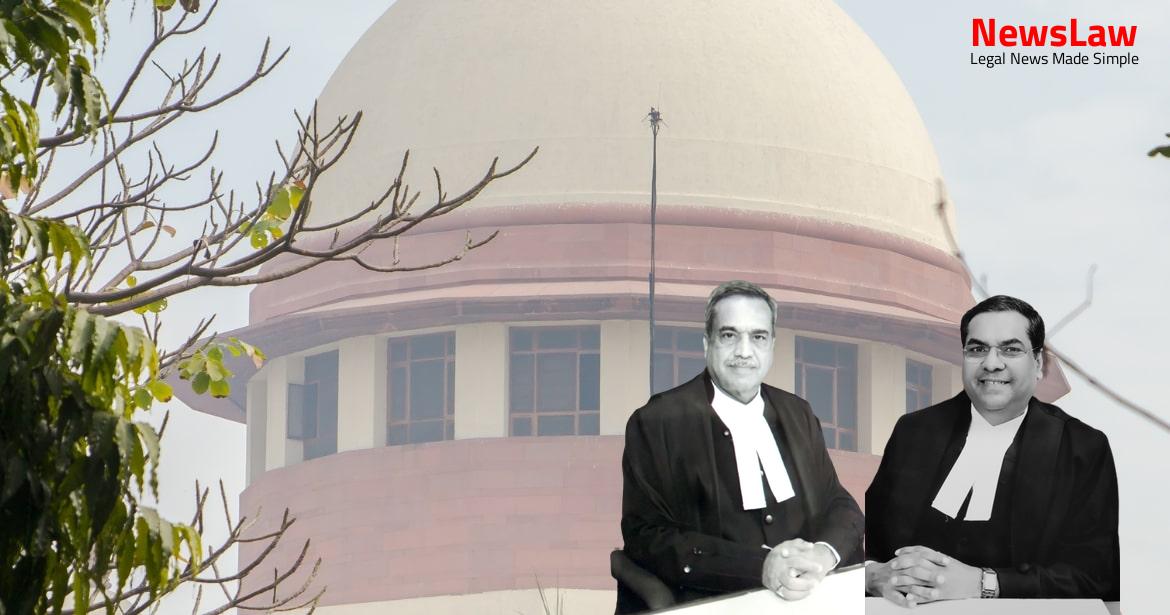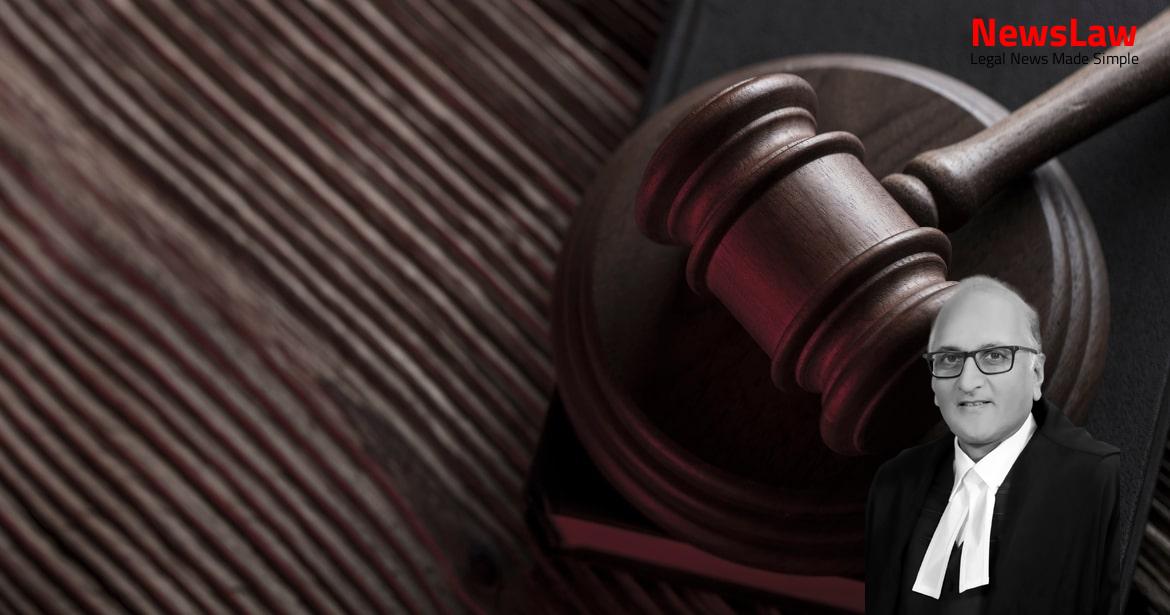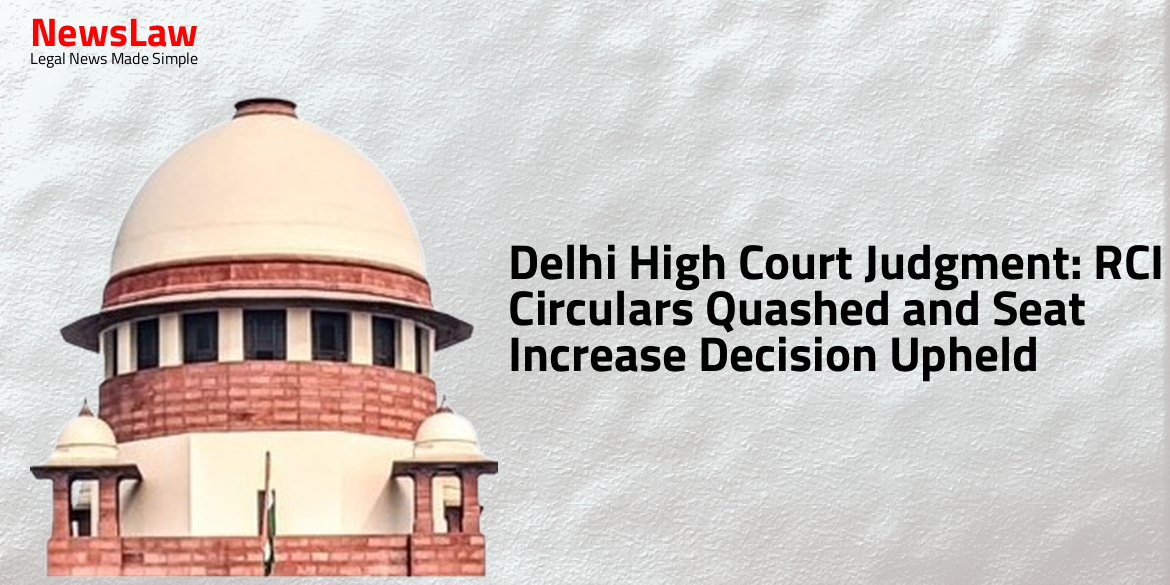Explore the detailed legal examination conducted by the High Court on the contentious issue of temple ownership. This summary focuses on the nuanced legal aspects considered by the court, shedding light on the complexities of the case and the reasoning behind the court’s analysis.
Facts
- The official respondents ordered the deletion of ‘Shri Mahabaleshwara Temple’, Gokarna from the notified temples list.
- A notification dated 30.04.2003/01.05.2003 included ‘Gokarna Mahabaleshwara Temple’ at Serial No. 92 under the Act.
- Petitioners sought deletion of the temple from the notification, claiming its attachment to their ‘Mutt’ excluded it as per Section 1(4) of the Act, 1997.
- The issue raised in the petitions was regarding the status of ‘Gokarna Mahabaleshwara Temple’.
- The appeal outcome would impact this case, along with the factual aspects needing further consideration.
- The petitions were admitted for hearing by granting leave, with delay condoned in SLP @ D.No.6578/21, and leave granted in all the petitions.
- The Act under which the temple was notified in 2003 was declared unconstitutional in 2006 by the High Court of Karnataka.
- The Government Order de-notifying the temple in 2008 was challenged by devotees and former trustees in the High Court.
- The High Court quashed the Government Order, keeping the temple as a notified temple under the Act of 1997.
- The High Court judgment was challenged in the case of State of Karnataka vs. Sahasra Lingesshwara in C.A. No. 5924/2008, with a stay order on the High Court judgment.
- A one-month stay was granted for the petitioner to remain in charge of the temple.
- The dispute over the temple ownership was referred to a competent Civil Court for determination.
- An ‘Overseeing Committee’ was constituted by the Division Bench of the High Court until the Act of 1997 is enforced, leading to the divestment of the petitioner ‘Mutt’ from temple administration.
- The petitioner approached this Court claiming to be aggrieved and the status quo was maintained by an interim order.
- The Court decided to conduct a detailed and exhaustive hearing on the petitions due to the complexity of the case.
Also Read: Electoral Malpractices in Mayor Election
Arguments
- The petitioners contended that the ‘Mutt’ has a history dating back to the 8th Century A.D., established by Adi Shankaracharya at Gokarna.
- A trust was created to manage the temple only to comply with the Bombay Public Trust Act, 1950.
- Arguments were presented by Dr. Abhishek Manu Singhvi and Shri Ranjit Kumar to challenge the High Court’s judgment, while Shri S.S. Nagananda supported it.
- The petitioners, including the 36th pontiff in an unbroken line, were accused of unjustly benefiting from the interim order granted by the High Court.
- The contesting respondents expressed concern that allowing the status quo to continue would be detrimental to them and other devotees despite their success in the High Court.
- There was a contention that the BPT Act does not apply to Karnataka, supporting the ‘Mutt’ in their claim over the temple.
- The contesting respondents disagree with the learned senior counsel for the appellants regarding the jurisdiction of the civil court.
- They argue that Section 68 of Act, 1997 does not bar the jurisdiction of the civil court.
- The High Court considered different factors and reached a conclusion contrary to the stance of the appellants’ counsel.
- The position taken by the High Court is being contested by the respondents.
Also Read: Balancing Power and Transparency: Electoral Bonds Struck Down, Disclosure Mandated
Analysis
- In the case under consideration, it is contended that the jurisdiction of the civil court should be invoked to decide the disputed question of fact.
- The authorities under the Act were in charge of the temple affairs from the 2003 notification until the order in 2008.
- Detailed consideration is required regarding the disputed status of the temple and the contentions of both parties.
- An appropriate interim arrangement needs to be made to protect the interests of all parties until the appeals are considered on merit.
- The status determination of the temple by the Tehsildar lacked substantial evidence and proper legal basis.
- Opinions expressed by the President of the Gram Panchayat and the overall improvement were not sufficient for satisfying legal requirements.
- The process leading to the order of entrustment of temple administration to the ‘Mutt’ did not adhere to the Act’s requirements.
- The notification indicating the temple’s governance under the Act was accepted by the appellants for five years until the proceedings in 2008.
- No formal enquiry was initiated under the Act with proper notice to the parties for determination of temple ownership.
- A subsequent amendment in the year 2012 allows disputed questions like temple ownership to be decided by the ‘Rajya Dharmika Parishad’.
- The High Court noted relevant documents but concluded that the factual determination of the temple’s ownership should be addressed in a civil suit, requiring documented proof which was not presented during the proceedings.
- Final decision to be taken in appeals
- Not appropriate to allow another course of action
Also Read: Recall of Resolution Plan Approval: Legal Analysis
Decision
- Appellant ‘Mutt’ to hand over charge of temple affairs to the Assistant Commissioner acting as Secretary to the ‘Overseeing Committee’.
- In the interest of the temple and devotees, an independent committee is suggested to administer the temple until a final determination is made.
- The ‘Overseeing Committee’ shall be chaired by Hon’ble Justice Sri. B.N. Srikrishna and consist of designated officials and nominated members.
- The committee will oversee the temple’s functioning while adhering to traditions.
- Notice to respondents in SLP @ D.No.6578/21 to complete pleadings.
- Pending detailed consideration and Act, 1997 validity, the ‘Overseeing Committee’ will administer the temple as an interim arrangement.
- Minor modification in the committee’s composition as ordered.
- Upon setting aside the order dated 12.08.2008, the temple’s inclusion in the Act, 1997 notification will revive, and administration will be adjusted accordingly.
Case Title: RAMACHNADRAPURA MATH Vs. SRI SAMSTHANA MAHABALESHWARA DEVARU (2021 INSC 259)
Case Number: C.A. No.-001631-001636 / 2021



